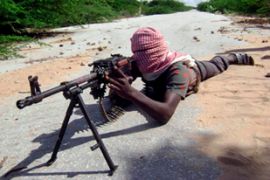Somali fighters seize three towns
Al-Shabab forces pro-government group out of towns in central Galgudud region.

“We will not stop until we take control of the whole region from the enemy of Allah,” he said.
The loss of the three towns will be a blow to Ahlu Sunna and the government, which signed a deal last month to work together against al-Shabab.
‘Steep price’
Al-Shabab, which the US says is affiliated to al-Qaeda, controls much of south and central Somalia, as well as large areas of Mogadishu.
| IN DEPTH |
|
|
US-based Human Rights Watch said on Tuesday that the group had “brought stability to some areas long plagued by violence”, but that the local population was “paying a very steep price”.
It accused the group’s fighters of “implacable repression and brutality” in the areas unders its control.
The transitional government has little real control over the country, holding only a few parts of the capital despite assistance from an international peacekeeping force.
On Thursday, the UN special representative to Somalia said that there could be no peace for the Horn of Africa country without national reconciliation.
“Somalia will not experience stability or peace without national reconciliation,” he told reporters after a meeting of the International Contact Group on Somalia, which includes representatives from the United Nations, the African Union and the Arab League.
“The essential problem in Somalia is instability rooted in the fact that every tribe or faction believes it has a right of veto, despite the existence of a government recognised by the international community and by neighbouring countries.”
Amr Mussa, the secretary-general of the Arab League, urged Somalia’s disparate groups not to reject the peace process, saying that their integration in the process was “without exception an essential condition for its success.”
“Without comprehensive reconciliation and support for the legitimate transitional government, reconstruction efforts in Somalia are doomed to fail,” he said.
Somalia has not had a functioning government since 1991.

